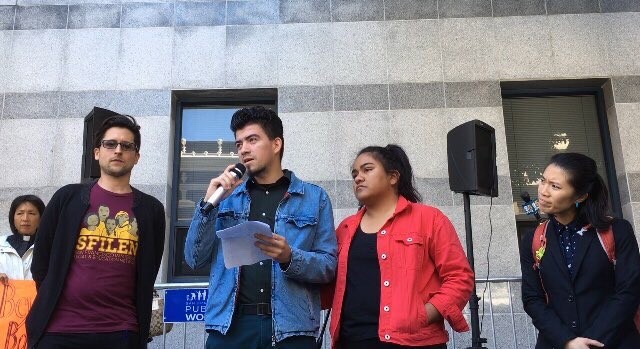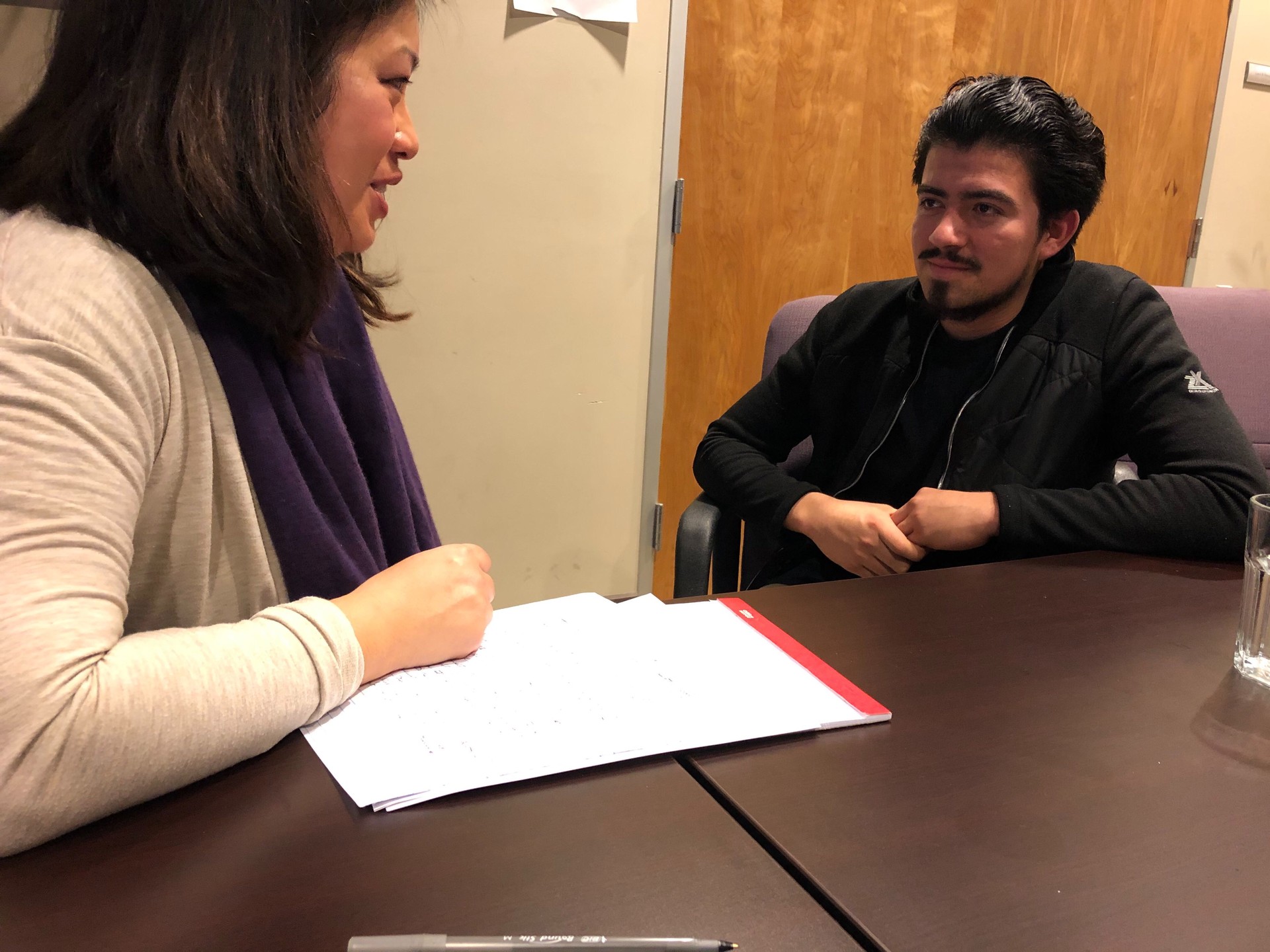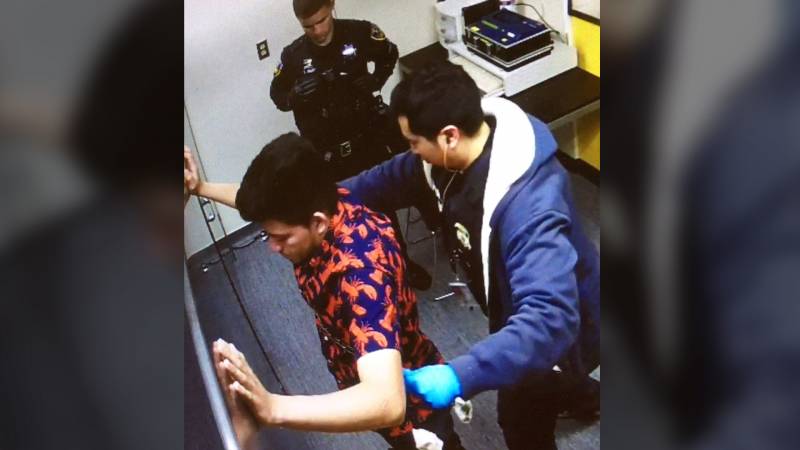In Daly City last spring, police handed over an undocumented construction worker to immigration authorities after a routine traffic stop. The officer did not issue a traffic citation, but instead called U.S. Immigration and Customs Enforcement from his patrol car to report the man.
In Laguna Beach in 2018, police arrested a college student on suspicion of driving under the influence. They notified ICE and held him in a cell until two immigration agents arrived at the city jail, handcuffed him and drove him away.
Neither man had been convicted of any crimes, and both should have been protected under California’s sanctuary law, said lawyers representing them.
The incidents are among at least a dozen formal complaints alleging police, sheriffs or jail officials violated Senate Bill 54. Attorneys with the ACLU and the Asian Law Caucus say there could be many more cases.
SB 54, known as the California Values Act, limits local law enforcement’s cooperation with federal immigration authorities to cases of serious convicted criminals.
More than two years after SB 54 took effect, it remains controversial. This week, President Trump said the federal government will begin withholding law enforcement grants from sanctuary cities and states, after an appeals court in Manhattan ruled they have the authority to do so.
Last month, speaking before a sheriffs’ conference, U.S., Attorney General William Barr announced a “significant escalation” in the federal government’s efforts to crack down on localities refusing to assist immigration enforcement.
In California, the Values Act has faced opposition from some local governments and a failed repeal initiative. The law has significantly decreased deportations from the state and protected potentially thousands of immigrants, but local law enforcement agencies don’t always comply, say attorneys tracking its implementation.
“California residents who are supposed to be protected by the law are not being protected in some cases,” said Jessica Bansal, an attorney with the ACLU of Southern California.
Law enforcement officials say they are trying their best to follow the law, but that it’s complex and confusing.
Claim Alleges Laguna Beach Police Violated State Law
Edgar Torres Gutierrez submitted a complaint in the fall of 2018. The college student has Deferred Action for Childhood Arrivals that protects him from deportation. But Laguna Beach police unlawfully turned him over to ICE on June 3, 2018, according to the administrative claim he filed with Bansal’s help.
Torres Gutierrez, now 29, had celebrated at the Pride Parade in Laguna Beach, where he lives, before he was arrested by a police officer on suspicion of DUI in the wee hours of the morning.
“I had a few drinks and I made a dumb mistake: I got in my vehicle and headed home,” said Torres Gutierrez, who attends Orange Coast College in Costa Mesa and has lived in the U.S. since age 3.
Torres Gutierrez, who had no criminal record at the time, was locked up at the Laguna Beach City Jail for about 15 hours. He expected to be released sooner, but ICE had filed a request for the jail to hold him, so immigration officials could arrest him there, he said.
Once two ICE agents arrived, they handcuffed him and drove him away in a van.
“It was scary. I was overwhelmed. I was confused,” said Torres Gutierrez, who didn’t understand why he was being arrested by ICE and erroneously feared the Trump administration had begun rounding up DACA recipients for deportation.
Under SB 54, California law enforcement may not detain people solely in response to a request by immigration authorities, or transfer people to ICE, unless those individuals were convicted of serious felonies or other crimes.
“The Laguna Beach police held him for hours past the point at which they should have released him,” Bansal said. “Local law enforcement agencies are not allowed to transfer people to ICE with limited exceptions. And none of those exceptions apply in this case.”
The ICE agents drove Torres Gutierrez to a federal building in Los Angeles, where he was interrogated, but eventually let go after they realized he had DACA, said Bansal.
In January, the city of Laguna Beach settled with Torres Gutierrez, agreeing to pay him $18,750 in damages, and to show all officers in its police department a new training video, approved by the ACLU, for the next two years. The city did not admit to any wrongdoing.

Laguna Beach Police Chief Laura Farinella declined to comment.
“The terms of the settlement speak for themselves and we have nothing to add at this time,” Farinella said in a statement.
Torres Gutierrez pleaded to the misdemeanor of reckless driving, and paid a fine of about $1,500, he said. His DACA status means that — unlike others who allege violations of SB 54 — he is not fighting deportation.
“Other people might be too scared to even talk about this,” said Torres Gutierrez. “It's important for me to be vocal about this because it could help other people.”
Daly City Police May Have Violated Sanctuary Law
Jose Armando Escobar Lopez was not so lucky.
On May 11, 2019, the construction worker was driving home with his girlfriend when he was stopped by police.
Escobar Lopez, a 21-year-old undocumented immigrant from El Salvador, did not have a criminal record, but he did have a pending deportation order that spurred the Daly City police officer to call ICE from his patrol car.
SB 54 prohibits police and other law enforcement agencies from inquiring about a person’s immigration status, or using any resources for immigration enforcement.
“You're not supposed to be contacting ICE and reporting people you think are undocumented. That's also immigration enforcement,” said Angela Chan, policy director and a senior staff attorney with the Asian Law Caucus in San Francisco, who represents Escobar Lopez in his administrative claim against Daly City and its police department.
Police did not issue a traffic citation or explain why they arrested him, according to Escobar Lopez’s complaint.
He remained handcuffed at a Daly City police station for about two hours, the complaint said, until an officer transferred him to a room where an ICE agent met him and put chains around his waist.
“I was so anxious I felt like throwing up,” said Escobar Lopez in Spanish. He added that he feared imminent deportation. “I don’t want to say goodbye to my girlfriend, my brother, my mom, my dad. All my family is here.”

ICE initially detained him at the Yuba County Jail and later transferred him to the Mesa Verde ICE Processing Center in Bakersfield, where he spent three months. He was released after immigration lawyer Jessica Yamane at Dolores Street Community Services in San Francisco intervened. He is currently fighting deportation.
The Daly City Police Department did not return KQED’s requests for comment on the case. But after public outcry, the city announced last summer it would investigate why police had detained Escobar Lopez and turned him over to ICE.
“These are people's lives that have been really significantly disrupted and in some cases ruined by violations of SB 54,” said Chan, who has filed additional complaints in the Bay Area since 2018.
More Claims Across the State
In addition to Daly City and Laguna Beach, 10 other administrative claims allege violations of SB 54 by police departments in Corona, Huntington Park and Tustin, near Los Angeles; as well as jail deputies in Madera County, and sheriff departments in Alameda, Contra Costa, Marin, Sacramento and Orange counties. These complaints could be precursors to lawsuits.
More cases could go unreported. “There could certainly be situations where an individual was turned over to ICE so quickly and deported that we were not alerted,” Chan said. “Unfortunately, there are cases we likely don't know about.”
All the departments facing complaints declined to comment on the cases, sometimes citing pending investigations. But several stated that they followed the law.
“We have provided SB 54 protections to several hundred people since the law was passed,” said Ray Kelly, a spokesman with the Alameda County Sheriff’s Office. “We take this law very seriously and do everything possible to make sure those protections stay in place.”
The California Immigrant Policy Center reported last year that more than 30 law enforcement agencies across the state continued to collaborate with federal immigration authorities “to facilitate the deportation of individuals who may be protected if the Values Act were thoroughly implemented.” The report found law enforcement officials were still giving immigration agents unfettered access to jails and providing office space for them, in violation of SB 54. The report also found information was being given in other ways — such as publicly posting the release dates of incarcerated people.
Understanding an 'Extremely Complicated' Law
Critics of SB 54 say it has made it more difficult for police and sheriff's deputies to protect the public, in part because the law bars them from participating in task force operations with federal agencies if the primary goal is immigration enforcement.
“We want to be able to go after criminals, whether they are U.S. citizens or immigrants,” said Brian Marvel, president of the Peace Officers Research Association of California, which has about 75,000 members. “When you start hampering law enforcement's ability to go after predators ... I think that's an issue.”
Still, Marvel said officers are not intentionally disregarding the California Values Act, which he said is “extremely complicated.”
The law allows officers to hand over people to ICE if they have been convicted of numerous crimes such as assault and child abuse, but only if the person was convicted within the past five years for misdemeanors, and 15 years for felonies.
“Unless you have some thorough training and explanation behind what you can and can't do, I think it's difficult to make sure that you follow this thing 100 percent,” said Marvel, a San Diego police officer for 20 years.
Instructions on how officers should implement SB 54 are left to individual law enforcement agencies.
The Commission on Peace Officer Standards and Training, established by the California Legislature in 1959, does not provide any guidance on the California Values Act, and it doesn’t track whether individual officers have received that training, said Meagan Catafi, a spokeswoman for the commission.

Los Angeles Assemblyman Miguel Santiago, who co-authored SB 54, said law enforcement agencies should be fully compliant by now. If they are not, he said the California attorney general should investigate.
“We will not defend any police department who is in violation of SB 54. I mean, the message is very loud and clear. You have to follow the law,” Santiago said. “And quite frankly, if it is determined that there is any wrongdoing ... the A.G. has the ability to enforce that law.”
Attorney General Xavier Becerra’s office has issued guidance for law enforcement to comply. The office also collects and reports data from law enforcement agencies on the number of transfers to ICE, and participation on task forces with federal agencies, as required by the law.
But not all law enforcement agencies are giving this information to the state’s Department of Justice, according to a report by the Attorney General’s Office, released last week.
The Attorney General’s Office declined KQED interview requests and won’t say whether it is investigating cases of alleged violations of SB 54.
But Becerra is defending the law in state and federal court, including in a challenge by the Trump administration. Last April, a federal appeals court upheld the law, ruling it does not impede federal immigration enforcement. However, the U.S. Department of Justice asked the U.S. Supreme Court to strike it down. The justices are currently deciding whether to take up the case.

